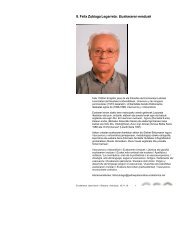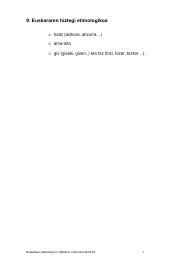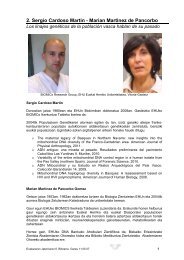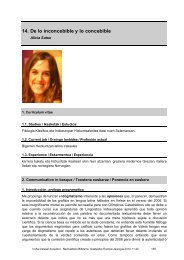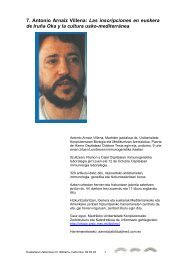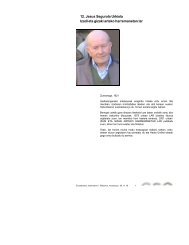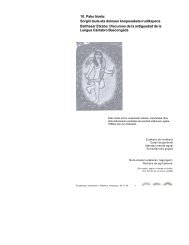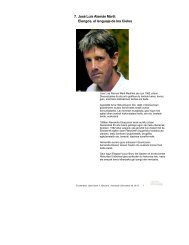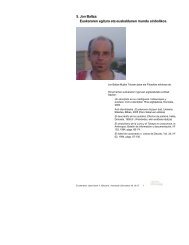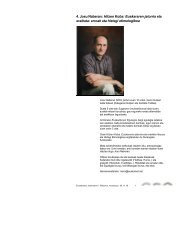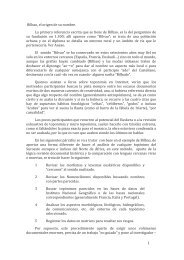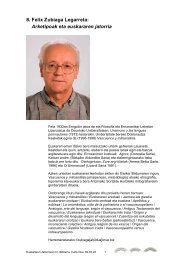Xabier Renteria Uriarte
Xabier Renteria Uriarte
Xabier Renteria Uriarte
Create successful ePaper yourself
Turn your PDF publications into a flip-book with our unique Google optimized e-Paper software.
prototipo kognitibo-linguistikoa” finkatuko dugu hasieran tresna kontzeptual gisa, eta egun<br />
mendebaldarrak ez diren tradizio filosofiko handienen parekoa dela argudiatuko dugu<br />
amaieran. Horra heltzeko, indoeuroparren lehen eragin arrotzen aurretik euskaldunok<br />
existentzia sentitzeko, kontzeptuatzeko eta hitzetan islatzeko modu berezia bagenuela<br />
onetsiko dugu, eta garai “modernoetara” aitzin munduikuskera horren zenbait arrasto<br />
mitologiko, linguistiko eta kultural -eskas baina sendo- heldu direla.<br />
Argudioetan erakutsiko dugu: munduikuskera edo weltanschauung delakoaren garrantzia;<br />
hizkuntzetan “arreta-fokatzaile” gisa diharduten “prototipo kognitibo-linguistiko”ak badirela<br />
eta aurrekoen gakoak direla; “Hutsaren arreta-fokatzailea” euskal munduikuskeraren<br />
funtsa eta hatsarria dela; oro har, berezko euskal prototipo epistemikoak<br />
aurreindoeuroparrak direla; eta beraien sistema orokorra egungo Europa mendebalekoa<br />
ez den “filosofia perenne” gisa oso ondo ulertzen dela.<br />
c) Long abstract<br />
We currently live in an absolute separation between mythology and language, but ancient<br />
cultures bornt in the times of symbiosis "mythology + language." Therefore, it could be<br />
invaluable to research the origin of the Basque and Basque from the point of view of these<br />
two aspects in common. And the key to this is the concept of "world view" or<br />
Weltanschauung. For example, Basque mythology is traditionally understood from the<br />
figure of Amalur or Mari as the personification of nature. But from a scheme of "worldview"<br />
first numen or deity indicates the image of the world, the essence of reality. And if we go<br />
into Basque, we see that the essence of things is defined by its emptiness ("kafe hutsa<br />
nahi dut", "lelo hutsa zara"), and the related mythological and semantic fields are<br />
consistent with this idea.<br />
It seems contradictory and illogical to apply as first ontological principle that "Reality =<br />
Emptiness = Mother Earth", but it's actually something typical of large non-Western<br />
cultural traditions of the planet. Our philosophy, language and origin are not a product of<br />
the stupidity of some cro-magnon eating acorns! This result is reinforced if we continue<br />
restructuring the Basque worldview form an according conceptual escheme. Where will go<br />
our traditionals historical victimism and cultural inferiority complex? To investigate our<br />
society and language from these keys will bring out new surprises, no doubt.<br />
Formally: we propose that it is conceptually possible to reconstruct ancient worldview of<br />
the Basques, and we advance the first axis to show it ("What is reality and how we<br />
know?"). To begin this reconstruction we will propose that in the Basque worldview an<br />
"attention-focuser prototype in the Emptiness " connects us and it puts us at the level of<br />
philosophical traditions which are not currently Western. This means that before the arrival<br />
of the Indo-European the Basques had a certain way of feeling, conceptualizing and<br />
reflecting on words the existence, so that certain traces in mythology, in the language and<br />
other cultural as art or popular collective structures have survived to this day.<br />
In the arguments we will show: the importance of the "world view" or "Weltanschauung";<br />
"attention- focusers" of certain "cognitive-linguistic prototypes" held the worldvies; Basque<br />
worldview stands on a " attention-focuser prototype in the Emptiness"; Basque epistemic<br />
protoypes are genuinely pre-Indo-European, and their overall system does not make<br />
sense in the current western culture but it is well understood as" perennial philosophy ".<br />
Euskararen Jatorriaren 8. Biltzarra - 2013.05.25 - Lazkao 31



